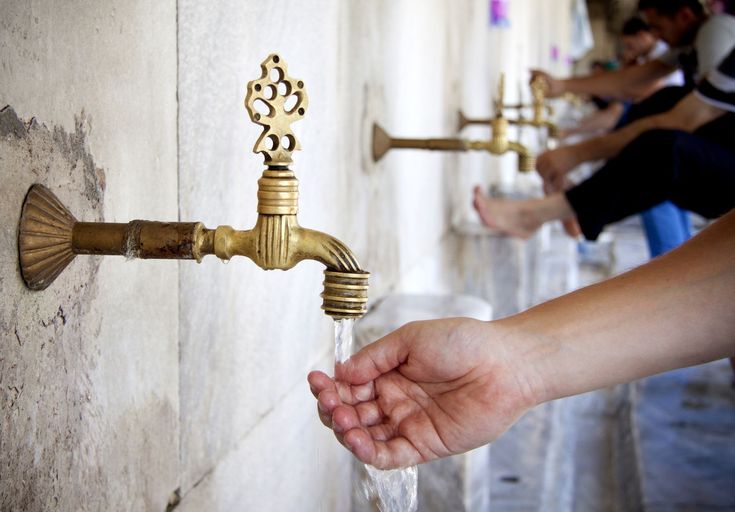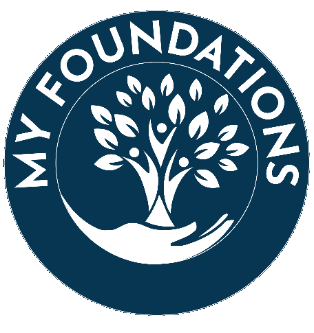- Phone No.: +44 7920015304
- Email:info@theislamicemailcircle.com
According to the practice of the Prophet, upon whom be peace, the correct manner of performing ghusl is:
1. wash both hands three times,
2. wash the private parts,
3. make a complete ablution (like the one made for prayer–the Prophet used to delay washing his feet until the end of his ghusl if he was using a tub, and so on),
4. rub water through one’s hair three times, letting the water reach down to the roots of the hair,
5. pour water over the entire body, begining with the right side, then the left, washing under the armpits, inside the ears, inside the navel, inside the toes and whatever part of the body can be easily rubbed.
This account is based on the following report from ‘Aishah: “When the Prophet, upon whom be peace, took his bath after sexual intercourse, he would begin by washing his hands. Then he would pour water from his right hand to his left and wash his sexual organs, make the ablution for prayer, take some water and put his fingers to the roots of his hair to the extent that he sees that the skin is wet, then pour water over his head three times and then over the rest of his body.” (Related by al-Bukhari and Muslim.)
In one narration it states, “He used to rub his head with his hands until he was certain the water reached his skin, and then he poured water over it three times.” It is also related that she said, “When the Prophet would perform ghusl after having had sexual intercourse, he would call for some water, which he would pour on his right hand to wash the right side of his head and then the left. He would then take water with both hands and pour it over his head.”
Said Maimunah, “I put water out for the Messenger of Allah to perform ghusl. He washed his hands two or three times, and then he poured water from his right hand to his left and washed his private parts, wiped his hands on the earth, rinsed his mouth and nose, washed his face and hands, washed his head three times, poured water over his body, and finally moved from his place and washed his feet. I brought him a towel, but he did not take it, for he shook the water off with his hands.” (Related by “the group.”)
Ghusl for women
A woman performs ghusl just as a man does, except that if she has plaited hair she does not have to undo it, provided that the water can reach the roots of her hair. Umm Salamah said, “O Messenger of Allah, I am a woman who has closely plaited hair on my head. Do I have to undo them for ghusl after sexual intercourse?” He said, “No, it is enough for you to throw three handfuls of water on your head and then pour water over yourself. After doing this, you shall be cleansed.” (Related by Ahmad, Muslim and at-Tirmidhi, who called it hassan sahih.) ‘Ubaid ibn ‘Umair reported that ‘Aishah discovered that ‘Abdullah ibn ‘Amr was ordering the women to undo their plaits of hair (for ghusl).
She observed, “It is amazing that Ibn ‘Amr orders the woment to undo the plaits of hair for ghusl. Why doesn’t he just order them to shave their heads? I and the Messenger of Allah used to bathe from one vessel, and all I did was pour three handfuls of water over my head.”(Related by Ahmad and Muslim.)
It is preferrable for a woman performing ghusl to cleanse herself from menstruation or post-childbirth bleeding to take some cotton smeared with musk or perfume and wipe it over the traces of blood. This will remove the bad smell of the menstrual blood. ‘Aishah reported, “‘Asma bint Yazid asked the Messenger of Allah about ghusl after menstruation has ended. He said, “She should use water mixed with the leaves of the lote-tree and cleanse herself.
Then she should pour water over her head and rub it well till it reaches the roots of the hair, after which she should pour water over it. Afterwards, she should take a piece of cotton smeared with musk and cleanse herself with it.” ‘Asma asked, “How should she cleanse herself with it?” He said, “Praise be to Allah, she should cleanse herself with it.” ‘Aishah said in a subdued tone that she should apply it to the traces of blood. ‘Asma then asked about bathing after sexual intercourse. He said, “She should take water and cleanse herself or complete the ablution, pour water on her head and rub it till it reaches the roots of her hair, and then she should pour water over herself.” ‘Aishah observed, “How good are the women of the ‘helpers’ that shyness does not keep them from learning their religion.” (Related by “the group,” except at-Tirmidhi.)
Questions related to Ghusl
It is sufficient to perform one ghusl for both menstruation and sexual impurity, or for the Friday prayer and the ‘id prayer, or for sexual impurity and the Friday prayer, if one has the intention for both of them. This is based on the Prophet’s saying, “All acts are based on intentions.”
If a person performed post-sex ghusl but did not make ablution, the ghusl will suffice. Said ‘Aishah, “The Messenger of Allah did not perform ablution after ghusl.” Ibn ‘Umar said to a man who had told him that he performed ablution after ghusl, “You went too far.” Says Abu Bakr ibn al-‘Arabi, “There is no difference of opinion among the scholars that ablution falls under the category of ghusl. If the intention was to remove sexual impurity, it also includes the minor impurities, as what sexual impurity prevents is greater than what the minor impurities prevent. The smaller one falls under the greater one, and the intention for the greater one suffices.”
It is acceptable for a person in post-sex uncleanliness or a menstruating woman to remove their hairs, cut their nails, go to the markets, and so on, without any dislike. ‘Ata said that such people can get cupped, cut their nails and their hair, and that this is allowed even if he (or she) has not performed the regular ablution. (Related by al-Bukhari).
One may enter a public bathroom. As long as he keeps his private parts from being seen, and he does not look at others’ private parts. Says Ahmad, “If you know that everyone inside the bathroom is wearing a loincloth, you may enter. If not, then don’t enter.” The Prophet, upon whom be peace, said, “A man should not look at another man’s private parts, and a woman should not look at another woman’s private parts.” There is no problem with mentioning Allah’s name in the public baths, as mentioning the name of Allah under any circumstances is good, since there is no text prohibiting it. The Messenger of Allah used to remember Allah under all circumstances.
There is no problem in drying one’s self with a towel or other cloth after performing ablution or ghusl during the summer or winter.
It is permissible for a man to use the water left over by a woman and vice-versa. This is derived from the fact that it is permissible for them to perform ghusl from the same container. Ibn ‘Abbas narrated that some of the Prophet’s wives were performing ghusl from a container. The Prophet came and performed his ablution or ghusl from it. They said to him, “We were sexually unclean.” He said, “The water does not become impure.” (Related by Ahmad, Abu Dawud, an-Nasa’i and at-Tirmidhi, who called it hassan sahih). ‘Aishah used to wash with the Messenger of Allah from one container, and they would take turns taking water until he said, “Leave some for me, leave some for me.”
It is not allowed to bathe in the nude in front of people. It is forbidden to uncover one’s private parts. If you cover it with some clothes, it is permissible. The Messenger of Allah would cover Fatimah with a curtain when she performed ghusl. If one performs ghusl in the nude, far away from the people, it is not prohibited. The prophets Musa (Moses) and Ayyub (Job) did so, as al-Bukhari, Ahmad, and an-Nasa’i recorded.
Your brother in islam
Jeelani Pasha
The Islamic Email Circle Copyright 2024 - All Rights Reserved





Leave Your Comments